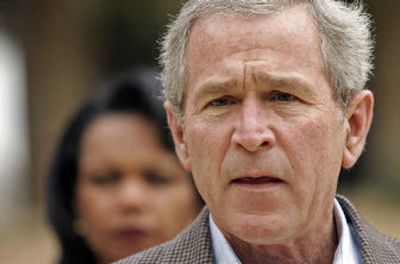Iraq plan needs more work, Bush says

CRAWFORD, Texas – President Bush worked nearly three hours at his Texas ranch on Thursday to design a new U.S. policy in Iraq, then emerged to say that he and his advisers need more time to craft the plan he’ll announce in the new year.
Burdened by low approval ratings on his handling of the war, the president is under mounting pressure to come up with a new blueprint for U.S. involvement in Iraq where the execution of Saddam Hussein – perhaps as early as this weekend – could incite further violence.
“We’ve got more consultation to do until I talk to the country about the plan,” Bush said, appearing outside an office building at his ranch.
“Obviously, we’ll continue to work with the Iraqi government. The key to success in Iraq is to have a government that’s willing to deal with the elements there that are trying to prevent this young democracy from succeeding.”
Vice President Dick Cheney; Secretary of State Condoleezza Rice; Gen. Peter Pace, chairman of the Joint Chiefs of Staff; and Secretary of Defense Robert Gates stood by Bush as he made his three-minute statement, then turned away, ignoring a reporter’s question about the pending execution.
He thanked U.S. troops for their service, yet offered no hint that he was poised to send more of them to war.
“As I think about this plan, I always have our troops in mind,” Bush said.
The president is considering the so-called surge option: increasing the number of troops in Iraq and embedding more U.S. advisers in Iraqi units in hopes of quelling violence to provide a window of opportunity for political reconciliation and rebuilding.
“I think the debate is really coming down to: Surge large. Surge small. Surge short. Surge longer,” said Tom Donnelly, a defense and security expert at the conservative American Enterprise Institute. “I think the smart money would say that the range of options is fairly narrow and driven by the situation on the ground in Iraq.”
Initially, White House advisers said Bush would announce a plan before Christmas. Then, they said it was more likely after the first of the year. His speech now is planned for the early weeks of January.
James Carafano, senior fellow at the conservative Heritage Foundation, said that if Bush is delaying his announcement, it has less to do with events in the United States and more to do with the situation in Iraq.
“If it were just picking a troop number, they’d be done by now,” Carafano said. “My guess is that (Bush’s plan) has to synchronize with some kind of Iraqi domestic political situation in Iraq.”
Some military experts support a surge in troop levels beyond the 140,000 already on the ground in Iraq. They contend this will provide a window of opportunity for rebuilding and a political reconciliation between the Sunni and Shiite factions.
Democrats and others in the military community say sending more troops only increases the Iraqis’ dependence on U.S. forces and allows them to delay making the painful political compromises needed to end the violence.
Democrats are calling on Bush to end America’s open-ended commitment in Iraq, and some want to see Congress put restrictions on funding any large increases in U.S. troops there.
“A surge which is not part of an overall program of troop reduction that begins in the next four to six months would be a mistake,” said Sen. Carl Levin, D-Mich., who will take over the Armed Services Committee when the new Congress convenes Jan. 4.
“Even if the president is going to propose to temporarily add troops, he should make that conditional on the Iraqis reaching a political settlement that effectively ends the sectarian violence,” Levin said.
The president’s unexpected remarks last week that he backs future expansion of the overall size of the Army and Marine Corps to lessen strain on ground forces was viewed as a possible hint that he plans to send in more troops.
In an action that might also foreshadow an increase in troops, the Pentagon on Wednesday announced that the 2nd Brigade, 82nd Airborne Division, based at Fort Bragg, N.C., will deploy to Kuwait to serve as the reserve force early next year.